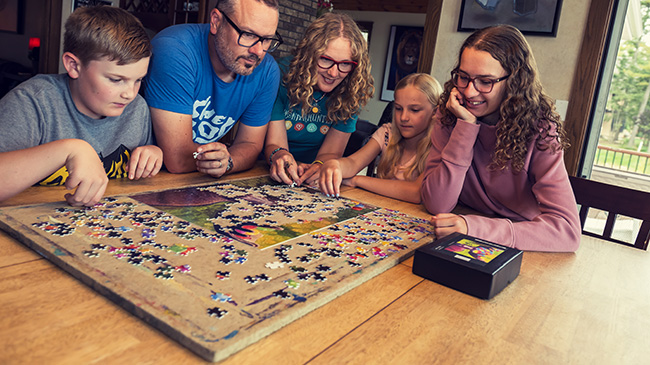
Imagine sitting at your kitchen table with a thousand puzzle pieces scattered before you.
A small island of interconnected pieces has taken shape. They were easy—the only face in the whole scene. You reach for a piece that looks like it could be part of the person’s hair. After rotating it and testing the fit a few times, you confirm it’s not the right one.
Then, angered that it didn’t work, you toss the entire table over in a furious rage. With pieces flying in every direction, you swear off jigsaw puzzles forever, convince yourself you stink at them, and remind yourself that you always knew this was how it would go. Then you slide into depression and inhale an entire can of Pringles, beating yourself up for not choosing the right piece.

Woah, you’re probably thinking, That’s not me, but whoever it is sounds like they have some serious anger management issues.
I know, it’s silly to think about getting so worked up over a simple jigsaw puzzle. Most people don’t descend into a shame spiral and immediately quit if one piece doesn’t fit. Most people just put it down and look for another one to try.
But what if the endeavor felt a little more…important?
In real life, how often do we beat ourselves up for making a wrong move? How often do we quit after the first setback? How often do we even hesitate to begin something new because we’re convinced it is beyond our capabilities, worried the journey is too arduous, or that we’ll look foolish to others if we struggle?
Maybe you’re engaged with a different kind of puzzle right now…
- Perhaps you’re trying to get a business idea off the ground
- Helping a child deal with a newly diagnosed health issue.
- Struggling to keep morale up amongst your team.
- Or maybe you’re adjusting to an overwhelmingly different work routine or environment.
Like a sea of puzzle pieces laid across your kitchen table, it probably feels pretty overwhelming. But what if you reframed your current challenge to be more like the approach you’d take in putting it together?
You know in advance what the end picture (aka “success”) is supposed to look like.
You know that every piece you pick up isn’t going to fit perfectly the first time.
You’re not sure how long it will take, but you know that if you keep trying pieces that look like they could work, you’ll eventually complete the puzzle.
And, most importantly, you know that you are not an idiot or a terrible person simply because one thing you tried didn’t work. Especially if it’s a puzzle you’ve never encountered before.
Sure, the stakes for your challenge are higher than those surrounding the assembly of a silly jigsaw puzzle.
However.
The strategies for solving it are exactly the same.
Anger and anxiety are not going to help one bit.
That’s why I always praise the benefits of tinkering.
Tinkering—and its delightfully playful connotation—helps lower the anxiety level so we can think more clearly. It reframes our mistakes so they are not so devastating, preventing anger and shame from getting a foothold.
Tinkering is a great tool that’s a lot like putting together a jigsaw puzzle.
You try a piece that looks like it might fit. If it doesn’t, you simply look for and try another one, and another one, until you find the one that does. Then you keep going, celebrating the little wins along the way. (There’s something gratifying about the feeling when a piece clicks into place, isn’t there?)
Oh, and you don’t toss the table in a fit of rage when something doesn’t work.
So, you know that dilemma you’re mired in right now? The one that’s got you filled with frustration and self-doubt?
Yes, it’s more important than a simple jigsaw puzzle.
But treating it more like one might be the missing piece you need to solve it.
